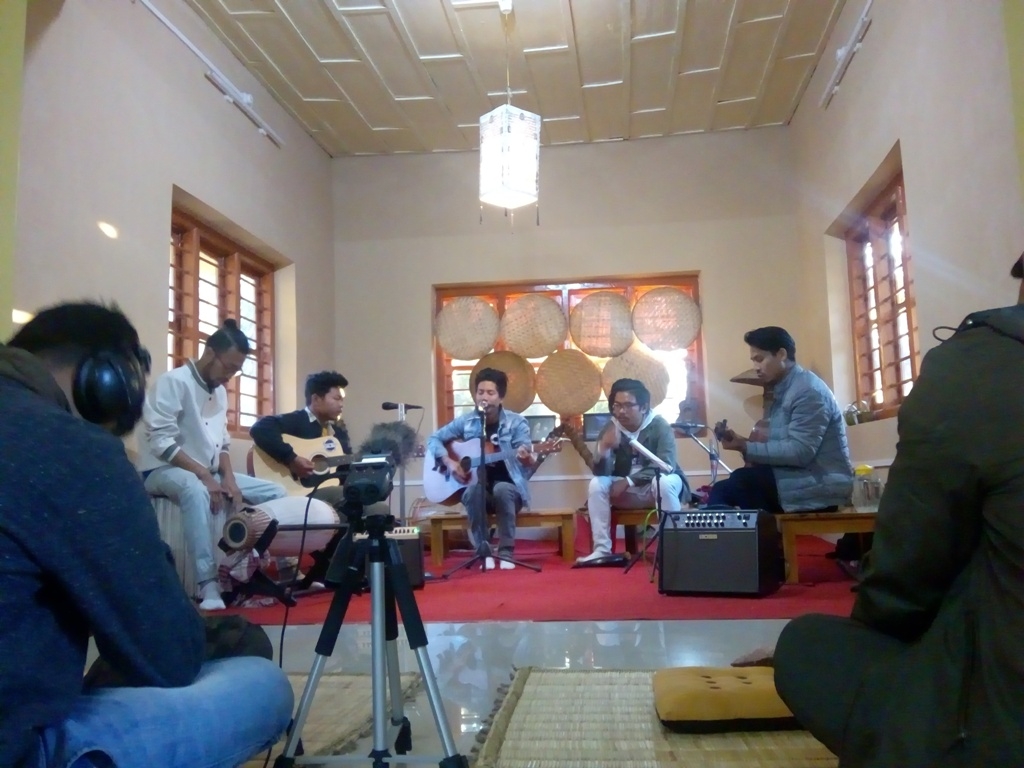
At a time when people’s voices are constantly suppressed, Phamsak at The Foothill – A Community Art Space in Khongampat on 11th January, 2020, comes to the rescue as a breath of fresh air as two folk-rock bands – Pebet and Imphal Talkies – get together, bringing back the culture of Phamsak while the fear of losing the indigenous culture is taking its seat. According to the organizers: “Derived from “Pena Phamsak” which is a way of storytelling-performance we bring you back the culture of Phamsak for the new generation. Phamsak are by nature intimate. And here we plan to bridge the gap between artists and audience.” At a foothill, with fields and lush greenery on the outside, the space has a setting with indigenous cultural ambience. The interior has small yangkok on the windows as backdrop complemented with long and slender longup capped with yempak. Four low height tables form an arc for the artists to sit down and deliver, facing rows of phak for the audience to sit down and absorb. On the side, there is a memorabilia – a board from the age-old adult movie cinema hall Imphal Talkies – a reminiscence for many. Some letters from the board are missing yet its essence is intact, like how the cinema hall does not exist yet it does exist. The audience and artists all arrive and as the clock hits around 4 pm, Akhu Chingangbam of Imphal Talkies calls everyone to come inside as the storytelling-performance is about to begin.
Opening the session, Pebet delivers stories of the working class life and struggle, just like what the organizers say “to give you an idea of contemporary music scene of Imphal and the politics within the bands.” Strumming their guitar strings, beating the pung and cajon drums, and teasing with pena and shakers, Pebet sings songs of their struggle for wanting to be artists yet being born in a poor family, experiences of police harassment as they go for their gigs (khut hekta thangatlo hairak-e, camera hekta kapke hai), wishes to continue singing and tell stories of indigenous class struggle that Lamyanba Hijam Irabot initiated (sur yaodrabasu sakke esei taru laowo), critique of the leaders (noidi houdong lamboiba olhoure, meeyanchana pebet ollaga paikhre), how family members have told them how good is chengi chabon among many stories of the working class. Every song has an echoing sing-along from the audience, making the story echo in all corners of the hall.
Following this act is Imphal Talkies with their seasoned performances. Apart from the pena, guitars, and drums, they also have a refreshing voice of Chaoba Thiyam with his folk singing. They narrate stories of Manipuri diaspora in Assam from their last visit and a different perspective of Manipuri patriotism.
With songs like Barak turel torband da Singerband gi khulda ningkhairaba torbanda khangpoksang sing leihou-e, Imphal Talkies tells stories of the lives on the river banks of Barak, their hardship, and how they still preserve the indigenous way of living. Picking up the beat and energy in the room, they revisit some of their songs like Qutub Minar, When the Home is Burning, Lullaby, etc. that speak volumes on the struggle and suffering of the people of Manipur because of mass militarization and killings. The audience cheers upon and echo along with the artists every word of the songs, which seems like syncing the emotions.
Another aspect that makes this Phamsak one of its kind is how friends and well-wishers lend their hands to volunteer in organizing the event. Some help in preparing snacks (kanghou, bora, changang), some in catering, some sponsor an electric generator for light. It gives a sense of community building with the common inspiration to build each other up, offering a safe space where everyone is free is express.
Words that people would have feared to voice out in public and on the streets, the audience sing-along those words with the artists in this space that is so enclosed, yet so free. There is dialogue, there is singing along, there is expression with no barrier, there are resisting voices, all coming together within the four walls, however, has it bridged the gap between the storytellers and the audience? – A question that lingered as people get up from the phamsak.



